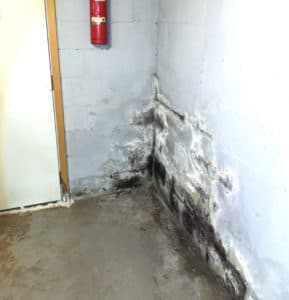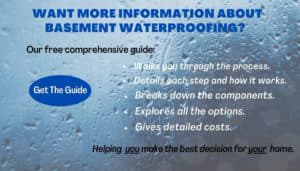Tips for Making Your Basement Ready for Storage

Originally posted 10/15/2018, updated 3/18/2021
I want you to reminisce with me for a moment. When you were house hunting, did you peek into closets and cabinets? Did homes with attics and basements interest you more, because they had added storage space? Even if you are a design minimalist, you will need places to store seasonal items. It’s a fact we all learn: no matter how mindful you are of acquiring “stuff,” over time closets, cabinets, and out-of-the-way spaces will fill up..
Eventually, this leads most homeowners to one of two actions. You can embrace the purge mentality and discard many sentimental or seldom-used items, or you can look for additional storage space. And your basement may be just the space you need.
But it’s important to make sure your basement is an acceptable storage space before you trust it with important items. At Acculevel, we know how damaging water intrusion can be to your home and your possessions. We’ve been repairing foundations and waterproofing basements since our start in 1996. Over the decades, we’ve helped more than thirty thousand homeowners restore health and stability to their homes, and we want to help you avoid the heartbreak that can happen when moisture destroys an heirloom.
We’re going to help you evaluate your basement for potential problems, determine what the solution(s) might be, and help you find a quality contractor who can make the repairs you need.
Start by Inspecting Your Basement
Obviously, if you have standing water anywhere in the basement, this is a major sign of trouble. But there are more subtle signs of problems on the horizon that you can miss if you’re not watching for them. The following checklist is part of our DIY Home Inspection Checklist:
- Start by evaluating the floorboards over your head. Do they look clean, dry, undisturbed by mold, rot or insects? You don’t want to store grandma’s hutch in a basement with termites. The floorboards are particularly significant if you have any sagging or sloping floors on the main floor. Sagging floors can be expensive to repair– the earlier you take steps to correct the issue, the better off your home and wallet will be.
- If everything overhead looks good, then check out the floor of your basement. Watch for cracks, water stains, or anything that could be a biological growth like mold. If there’s a built-in drain in the floor, you may want to have a plumber install a backwater valve. This ensures that water can only flow out of your home not into it.
- Last, but not least, evaluate each wall of the basement. Again, you’re looking for cracks, water stains, mold, mildew, etc.
Address Any Issues You Find
Spending money on home repairs isn’t something any homeowner enjoys, but it’s important to solve any problems you find promptly. The longer you procrastinate, the more expensive the repairs will become.
Foundation Cracks
If you’ve found cracks in your basement walls, you should have these assessed by a professional. Foundation cracks are generally a sign of hydrostatic pressure (water pushing against your home’s foundation) or uneven foundation settling. We have an article that summarizes the 3 major types of cracks you’ll find in your foundation, and have rated them on the urgency of repair.
Water Damage
Water intrusion should be repaired by installing an effective water drainage system with a sump pump. There are different types of drainage, and the best one for your home will depend on what kind of basement floor you have.
If you don’t have water seeping in, but the basement feels damp, this may not require drainage. A dehumidifier is an excellent investment in any home in our service area; the midwest is known for its dramatic weather changes throughout the year. Humidity is bad for your foundation, your belongings, and your health. Research has shown that too much or too little humidity allows for viruses and bacteria to flourish; the ideal humidity level is 50%. We explain how useful a house dehumidifier can be in this article.
 This photo was taken by an Acculevel project manager during a free estimate appointment. Water has been seeping into the basement and allowing mold to grow.
This photo was taken by an Acculevel project manager during a free estimate appointment. Water has been seeping into the basement and allowing mold to grow.
Biological Growth
If you believe you have mold in your basement, proceed with caution. The EPA recommends that if the area affected is larger than 10 square feet, you need a professional contractor to evaluate it. We have an article about how Acculevel treats biological growth, and the associated costs. Mold is not something to be taken lightly; even the benign types can be harmful to those with allergies, asthma, or respiratory ailments. In fact, even if you are in excellent health, long term exposure can increase your chances of developing respiratory issues.
If it is a small area and you are determined to treat the issue yourself, please do not use bleach. Bleach is an effective cleanser, but it is meant to be used only on non-porous surfaces. I guarantee your home’s foundation is built out of a porous material: rock, brick, concrete, cinder block, and wood are all porous.
How Do You Find a Good Home Repair Company?
One of the best ways to find a qualified contractor is by asking friends and neighbors. If someone you know has had a good experience with a service provider, put them on your list. You can also check with your HOA or the realtor you worked with to buy your home; they often maintain a “preferred” list of contractors to recommend. You should always verify the contractor is a qualified, licensed and insured company; the Better Business Bureau is an excellent resource for homeowners to use.
When you are meeting with contractors, make sure they are the right choice for you. We have a detailed list of questions you should ask a contractor, and I highly recommend it. These questions are the result of multiple conversations with our own customers, call center representatives, and project managers. We developed this list to help homeowners protect themselves against questionable business practices, companies that are not transparent about pricing or warranties, etc.
Want More Information About Basement Waterproofing?
We have another free resource to offer homeowners: our comprehensive guide to basement waterproofing. Bookmark it now, so you have it available whenever you have questions. We update it regularly, to add or revise materials, services, and pricing. 